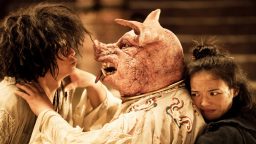 Journey to the West is an astonishing film. It simply couldn’t be made here.
Journey to the West is an astonishing film. It simply couldn’t be made here.
In the first place, the Orient lacks the sort of contempt for fairytales that is all too prevalent here. Whatever force it is that impels Hollywood revise them to fit our contemporary anti-morals, fill in touching backstories for the villains, and rewrite the protagonists to make them thoroughly contemptible… it evidently has failed to afflict the East to anything like the same degree. This film positively exudes charm and wonder.
Secondly, the East as not been aggressively secularized to the same degree as the West. The flatness you see in most American fantasy since about 1980 or so just isn’t here. You get an Asian cosmology in all its glory and none of the action can be understood apart from it. Buddhist precepts are integral to the story. And the demonology is in stark contrast to our typically Catholic assumptions on how those sorts of creatures ought to function.
Finally, there’s something different about the hapless schlemiel and his “strong female character” associate. I won’t spoil the film by pointing out precisely what it is, but you simply won’t see these sorts of characters handled in anything remotely like this fashion here in the West. It’s unthinkable.
If you have a yen for taking in a movie and would like to try something different from the latest retread of the exact same plot structure you’ve witnessed countless times, you can do a lot worse than giving this a shot. It even has a wise old Chinese man playing the role of spiritual mentor rather than a bald Scottish woman!
That’s a great film! Think I caught it on Netflix a couple years ago.
Not sure I’d agree about the point secularization in the East, though. I mean I think you’re right about *aggressive* secularization – when I lived in Japan, I never encountered the hang-wringing about keeping your religion private that you see from the Left here. But the way the cosmology and Buddhism (and Shinto in Japan) and animism have all melted together over the centuries has kind of fallen away into a kind of superstition. Most of the people I knew over there observed the semi-religious traditions and customs more as cultural affairs than spiritual ones — kind of like what Christmas has become for many people in the West. That was my perception of people in Japan, anyway. But yeah, there are plenty of holdovers that make for rich storytelling – all the oni and gods and heroes that you see used time and time again in different fashions, that’s true. Maybe they’ve retained that better than we in the West.
I’ve enjoyed many of the more fantastic adventures coming from China as of late. I’ll have to check it out, and compare it to the likes of a Tai Chi Hero.
My uncle used to be married to an Indonesian woman and I thought it was interesting that she really loved western horror movies and not in an ironic way like so many in the U.S. do. According to her, in her homeland superstition is still fairly prevalent and even characters like Freddy Krueger are regarded with terror rather than amusement because from their perspective those kinds of evil spirits are still out there and can get you if you’re not wary.
Rod Walker thinks this is an excellent screenshot to accompany this post, although he does suddenly find himself thinking of a BLT.
On topic, he recently found himself watching a Korean soap opera while too sick to do anything but watch television, and was surprised by the ready and un-ironic acceptance of supernatural elements in what was otherwise a conventional soap opera story – body-swapping, ancestral spirits, magical powers, time travel, and so on.
Jeffro, are you referring to Stephen Chow’s film? There have been a few “Journey to the West” films over the years.
Rod, the series you describe sounds like “Go, Princess, Go”, a low-budget historical romcom web series that came out of nowhere and lit up China last year. It made news here in the West when the Chinese government ordered it taken offline and censored, for some of the aspects you describe.
On a related note, audiobook version of “Monkey” that is being sold on Audible, narrated by one Kenneth Williams, is quite excellent. I blazed trough it in few afternoons. Guy puts real effort and emotion into his reading, you can tell that he both understands and loves the source material. I guess that one issue is that narration was originally produced in early 80s, so there’s this echo and very slight scratchiness to the sound. I kinda like it, to be honest, it gave this vintage quality to it, like listening to old time radio readings of stories and poetry. I’m weird like that.